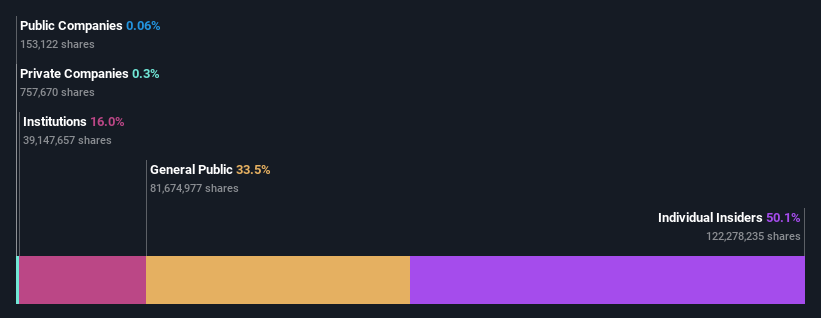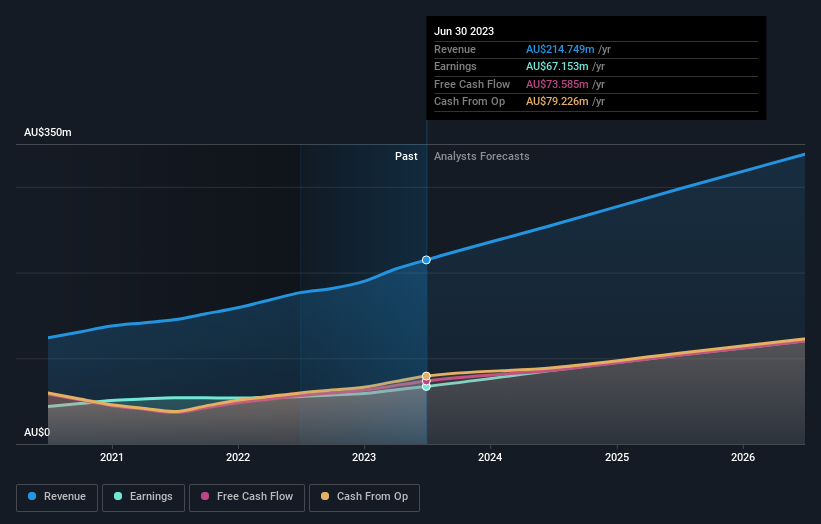Insiders still own 50% of Netwealth Group Limited (ASX:NWL) despite recent sales
Key Insights
Insiders appear to have a vested interest in Netwealth Group's growth, as seen by their sizeable ownership
54% of the business is held by the top 2 shareholders
If you want to know who really controls Netwealth Group Limited (ASX:NWL), then you'll have to look at the makeup of its share registry. And the group that holds the biggest piece of the pie are individual insiders with 50% ownership. That is, the group stands to benefit the most if the stock rises (or lose the most if there is a downturn).
Insiders are at the top of the company's shareholdings despite selling some shares recently. As a result, they were also the biggest winners as market cap hit AU$3.6b last week.
Let's take a closer look to see what the different types of shareholders can tell us about Netwealth Group.
See our latest analysis for Netwealth Group
What Does The Institutional Ownership Tell Us About Netwealth Group?
Institutional investors commonly compare their own returns to the returns of a commonly followed index. So they generally do consider buying larger companies that are included in the relevant benchmark index.
We can see that Netwealth Group does have institutional investors; and they hold a good portion of the company's stock. This implies the analysts working for those institutions have looked at the stock and they like it. But just like anyone else, they could be wrong. When multiple institutions own a stock, there's always a risk that they are in a 'crowded trade'. When such a trade goes wrong, multiple parties may compete to sell stock fast. This risk is higher in a company without a history of growth. You can see Netwealth Group's historic earnings and revenue below, but keep in mind there's always more to the story.
Hedge funds don't have many shares in Netwealth Group. Our data suggests that Michael Heine, who is also the company's Senior Key Executive, holds the most number of shares at 48%. When an insider holds a sizeable amount of a company's stock, investors consider it as a positive sign because it suggests that insiders are willing to have their wealth tied up in the future of the company. With 5.9% and 1.5% of the shares outstanding respectively, Netwealth Investments Ltd. and The Vanguard Group, Inc. are the second and third largest shareholders. Furthermore, CEO Matthew Alexander Heine is the owner of 1.5% of the company's shares.
To make our study more interesting, we found that the top 2 shareholders have a majority ownership in the company, meaning that they are powerful enough to influence the decisions of the company.
While studying institutional ownership for a company can add value to your research, it is also a good practice to research analyst recommendations to get a deeper understand of a stock's expected performance. Quite a few analysts cover the stock, so you could look into forecast growth quite easily.
Insider Ownership Of Netwealth Group
While the precise definition of an insider can be subjective, almost everyone considers board members to be insiders. Company management run the business, but the CEO will answer to the board, even if he or she is a member of it.
Insider ownership is positive when it signals leadership are thinking like the true owners of the company. However, high insider ownership can also give immense power to a small group within the company. This can be negative in some circumstances.
Our information suggests that insiders own more than half of Netwealth Group Limited. This gives them effective control of the company. Insiders own AU$1.8b worth of shares in the AU$3.6b company. That's extraordinary! Most would be pleased to see the board is investing alongside them. You may wish to discover if they have been buying or selling.
General Public Ownership
With a 33% ownership, the general public, mostly comprising of individual investors, have some degree of sway over Netwealth Group. This size of ownership, while considerable, may not be enough to change company policy if the decision is not in sync with other large shareholders.
Next Steps:
While it is well worth considering the different groups that own a company, there are other factors that are even more important. For instance, we've identified 1 warning sign for Netwealth Group that you should be aware of.
If you are like me, you may want to think about whether this company will grow or shrink. Luckily, you can check this free report showing analyst forecasts for its future.
NB: Figures in this article are calculated using data from the last twelve months, which refer to the 12-month period ending on the last date of the month the financial statement is dated. This may not be consistent with full year annual report figures.
Have feedback on this article? Concerned about the content? Get in touch with us directly. Alternatively, email editorial-team (at) simplywallst.com.
This article by Simply Wall St is general in nature. We provide commentary based on historical data and analyst forecasts only using an unbiased methodology and our articles are not intended to be financial advice. It does not constitute a recommendation to buy or sell any stock, and does not take account of your objectives, or your financial situation. We aim to bring you long-term focused analysis driven by fundamental data. Note that our analysis may not factor in the latest price-sensitive company announcements or qualitative material. Simply Wall St has no position in any stocks mentioned.


